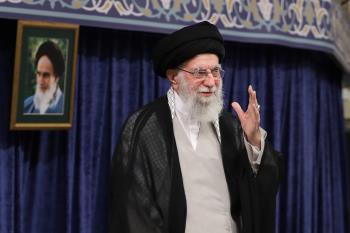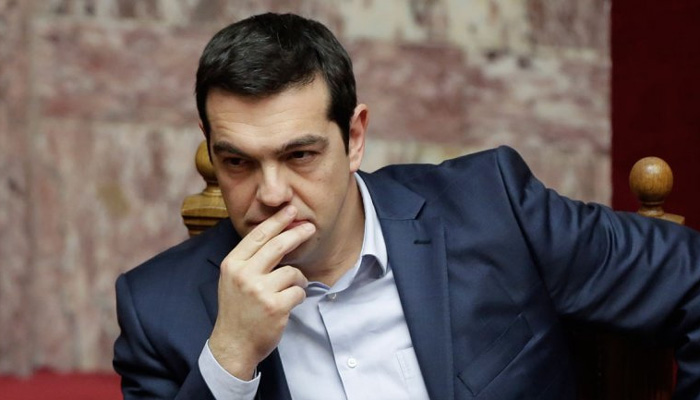Alwaght- Greece is a country that in recent years has faced one of the most severe financial crises, and there have been always many protests leading to clashes. Actually, the Greek have been expressing their concerns and discontent over economic measures of the European Union in the streets of Athens.
Alexis Tsipras made a visit to Tehran this year, and this encouraged us to review the ideas, activities, and aspirations of Tsipras and his ruling party. Alexis Tsipras, the prime minister of Greece together with a political and commercial delegation made a visit to Iran's Isfahan and then to Tehran on 7 February, 2015 and had a meeting with the country's supreme leader and the president of the Islamic republic of Iran. In the meetings, they discussed regional issues and the dependence of Europe on the United States.
Tsipras is known as a person who threatens not only the future of Greece in Europe, but also the future of the Eurozone. Greece and Italy are the most indebted Eurozone countries that need to attract more foreign investment to reduce pressure on their economy. Therefore, Tsipras’ visit to Tehran could also be evaluated as an attempt to pursue a part of such a goal.
It should be noted that the views of the Sryiza party about not accepting the Eurozone and the European Union is more extreme than those of Tsipras, the party leader. That's why in the West he is called a moderate person among the left-wing parties.
Tsipras began his political activities in the late 1980s. When he was less than 20 years old, he joined the youth wing of a political left-wing organization called "Communist Youth of Greece". Tsipras’ political activities became more serious when he went to university. As a university student, Tsipras joined the ranks of the renascent left-wing movement, particularly the "Enceladus", and soon succeeded to enter the University Senate. For three years, he was an elected member of the Central Council of the National Students Union of Greece. After the departure of the Communist Party of Greece from Synaspismos in 1991, Tsipras remained in the coalition, and in May 1999 he was elected as the first political secretary of Synaspismos' youth-wing, the Synaspismos Youth.
Four years later, he won an inter-party competition and joined the main organization within the party. In the meantime, he was well-known for his social tendencies and attention to global anti-capitalist movements such as the anti-globalization movements. As a result of all this, in 2004 Tsipras was finally elected for membership in the party's Central Council, and took over the responsibility for educational and youth issues.
During the 2006 local election, Tsipras first entered the limelight of mainstream Greek politics, with 10.5 percent of the votes in Athens, and Tsipras won a seat on the Municipality of Athens council by virtue of him being the first on the Syriza list. In 2008, when the head of the Syriza party decided not to nominate for re-election, Tsipras was elected as the president of the party, at a time when he was only 33 years old.
His party won 22 percent of the votes in the whole Greece in 2012 election. At this time, the party formed a Shadow Cabinet to monitor the government activities and it is not surprising that Tsipras was the head of the Shadow Cabinet.
In 2013, he was the first prospective candidate proposed for the position of President of the Commission of the European Union by the European United Left. During the campaigns to get this position, Tsipras delivered a speech in English in Berlin. He clarified many of his positions, in opposition to the allegedly Merkel-dominated neoliberal political course in Europe. He addressed those who lost out as result of the financial crises, which produced unexpectedly high jobless rates in most of the EU. Tsipras declared a substantial change for a better future for all Europeans is visible within 10 years. Nevertheless, the success of pro-Tsipras parties in entering the European parliament was not significant.
In the general election in 2015, the party whose head was the middle-aged Alexis won the majority (145 seats out of 300). As a result, the Shadow Cabinet was formed, and Tsipras was elected as the prime minister. Although his party had won the necessary votes, but since it needed two more seats to have the absolute majority, he was had to enter a coalition with a right-wing party. Eventually, he was sworn in as prime minister on 25 January 2015 and since he was a self-described atheist, the same as many Communists, and had openly proclaimed it, in the oath of office, he said: "I declare in my name, honor and conscience to uphold the Constitution and its laws."
It is noteworthy that Sryiza party which began its activities from 2004, with the slogan of ‘Changing the Europe’, was against the Eurozone and supporting all classes (a policy not adopted in plans of the EU), and has always been making advances. Sryiza was a perfectly united party until 2013, and in each term has won more seats in the Parliament. However, from 2013 due to severe crisis in Greece and the austerity measures imposed by the European Union, interference of the intrusive Western parties, and public protests, the party was split on the issues. However, in his speech Tsipras reiterated that he is determined to change Europe, and has taken some steps, and his government would be an inclusive one which would support all classes. Nevertheless, the main and old body of the party is still based on undermining the EU and opposition to activities of the Israeli regime; he also fiercely criticizes the Western capitalist economic system.



























